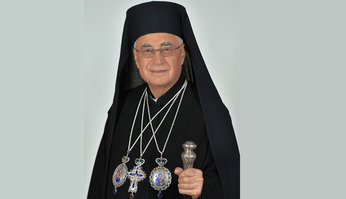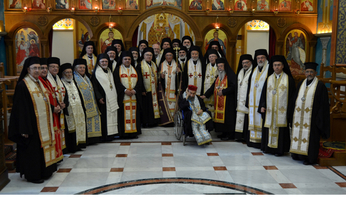Patriarch Youssef
The Church of Damascus praying and fasting Opening of the initiative in the Melkite Greek Catholic Cathedral 22 September 2014
The Church of Damascus praying and fasting
Opening of the initiative in the Melkite Greek Catholic Cathedral
22 September 2014
Present were Patriarch Gregorios III, bishops and other representatives of all Damascus’s Churches,
the Chargé d’Affaires of the Apostolic Nunciature, Syrian media (press and television)
The disciples were faced with the tragic situation of a young man possessed by a dumb spirit, which
tore him so that he fell to the ground, foaming at the mouth.
The disciples were unable to cope with the situation, but Jesus cured the young man and gave him
back to his father, safe and sound.
Later his disciples asked Jesus privately, “Why could not we cast him out?” Their Master replied in
the words of the verse which is the title of this initiative, “This kind can come forth by nothing, but
by prayer and fasting.” (Mark 9: 29; Matthew 17: 21)
This is our situation. We are in the fourth year of the way of the cross, Syria’s passion. That is the
great, blood-stained tragedy of our people. We, your bishops, are powerless before the suffering of
our people, their pain and their questions about the gloomy future whose lowering clouds presage
further storms, destruction, death, exile and emigration.
We can only reply as Jesus did, “This kind can come forth by nothing, but by prayer and fasting.”
We find ourselves in a similar situation to that experienced by the disciples and the first Christian
community before us and even of Jesus himself.
Indeed Jesus prays and sweats blood in the Garden of Gethsemane. He prays in great distress, but
also abandoning himself to the Father’s will. “Father, if thou be willing, remove this cup from me:
nevertheless not my will, but thine, be done.” (Luke 22: 42; Mark 14: 36; Matthew 26: 39)
On the cross, Jesus cries, “Eli, Eli, lama sabachthani?” that is to say, “My God, my God, why hast thou
forsaken me?” (Matthew 27: 46; Mark 15: 34)
The disciples, when their little boat was tossed by strong waves, shouted, “Lord, save us: we perish.”
(Matthew 8: 25; Luke 8: 24; cf. Mark 4: 38)
There were also tragic situations in the life of the first Christian community, as described in the Acts
1. And they continued steadfastly in the apostles' doctrine and fellowship, and in breaking of
bread, and in prayers. And fear came upon every soul... And all that believed were together,
and had all things common... And they, continuing daily with one accord in the temple...
1
2. Peter and John were imprisoned (as Metropolitan Paul Yazigi and Archbishop Gregorios
Yuhanna Ibrahim have been abducted), which harshly affected the first Christian community,
whose members met to raise this impressive prayer to God,
“Lord, thou art God, which hast made heaven, and earth, and the sea, and all that in
them is: who by the mouth of thy servant David hast said, 'Why did the heathen rage,
and the people imagine vain things?' The kings of the earth stood up, and the rulers
were gathered together against the Lord, and against his Christ. For of a truth against
thy holy child Jesus, whom thou hast anointed, both Herod, and Pontius Pilate, with
the Gentiles, and the people of Israel, were gathered together, for to do whatsoever
thy hand and thy counsel determined before to be done. And now, Lord, behold their
threatenings: and grant unto thy servants, that with all boldness they may speak thy
word, by stretching forth thine hand to heal; and that signs and wonders may be done
by the name of thy holy child Jesus.” (Acts 4: 24-30; Psalms 146: 6; 2: 2)
3. The early Church again suffered a great calamity with the martyrdom of James, brother of
John and the new imprisonment of Peter, as described in the Acts of the Apostles 12: 1-5.
Saint Paul recommends us to “pray without ceasing” (1 Thessalonians 5: 17) and our Lord kneeled to
pray on the night of his Passion.
The early Church gathered to pray in times of distress, persecution and abduction.
We too wish to do the same. That is why we have agreed among ourselves - patriarchs with other
bishops, priests, parishioners, monks and nuns - to raise our prayers for a whole month, with our
faithful in our parishes, so that suffering Damascus, soaked in the blood of its children, can become
a vast church where prayers and incense rise heavenwards for Syria’s peace and security and victory
As we say in our prayer, “Have mercy upon us, O Lord, have mercy upon us: we sinners, your
servants incapable of response, offer you as Master this supplication...” Yes, we are all incapable of
response to the suffering of our people in all regions of Syria.
We continue in our prayer, “Lord, have mercy on us for we have trusted in thee. Do not be angry
with us, do not remember our transgressions, but, being merciful, look graciously on us and deliver
us from our enemies ,for thou art our God and we are thy people, all the work of thy hands and we
We turn to the Mother of God and Ever-Virgin Mary, “O blessed Mother of God, open to us the
gate of compassion, so that by placing our hopes in thee we may not perish; but may be delivered
through thee from adversities; for thou art the salvation of the Christian family.”
With these feelings, we begin our way of prayer and fasting. We shall go from one quarter of
Damascus to the next. We shall walk in the streets of Damascus. We shall pray in all the churches of
Damascus, raising our arms, on our knees, suffering and trusting.
2
We suggest a voluntary fast this month: I want to fast.
Can we forget the example of Pope Francis, who prays continually for Syria, that he is fond of calling,
On 7 September 2013, he launched a global appeal, inviting prayer for peace and spent five hours in
prayer in Saint Peter’s Square. That is how he stopped the impending attack on Syria.
Today for a month we shall be raising our prayers for God to avert the dangers that strike us every
day on all sides, daily mowing down victims in all our quarters, destroying our homes and displacing
our children or forcing them to emigrate.
We pray also for the repose of the souls of all the victims who die every day in Syria, Iraq, Lebanon
and elsewhere in our martyred Middle East.
It is a great joy for us all to see all our Churches taking part in this initiative: you can see here
representatives of the patriarchs and other main leaders of Damascus’s Churches. You are glad, as
are we, to see the dear Eastern Patriarchs of one heart and mind, spirit and action, speaking as one
for Syria, its victory and the unity and the solidarity of all its children, its president and army, peace
So we Catholic and Orthodox patriarchs have together visited our brothers and sisters driven from
their homes and villages in Iraq. We went together, speaking as one, to Washington. We shall be
taking other initiatives and steps. We (Catholic patriarchs) will be in Rome to take part in the synod
on the family, next month. We shall have many contacts, not just in the Catholic world, to plead the
cause of peace in Syria, Lebanon, Iraq, Palestine and the whole Middle East.
May our prayers reach the ears of the terrorists, bandits, criminals, killers, mercenaries and arms
dealers terrorising our towns and villages. May they enter their hearts, consciences and feelings!
May our prayers change the face of our country, so that it is no longer a land of war, but rather of
peace, security, love, forgiveness, reconciliation and fellowship!
We hope that our prayers will help to bring inner peace, trust and hope, as our Holy Father Francis
recommended to us, “Never let the flame of hope to be extinguished in your hearts!” He also said,
“Let us never lose the courage of prayer.”
That is what I hope for from this initiative of prayer and fasting. In the name of the Father, the Son
and the Holy Spirit, one God, and at the intercession of the Mother of God and Ever-Virgin Mary, our
Lady of Damascus, whose icon will accompany you in all churches. Amen.
Sermon preached by H.B. Patriarch Gregorios III in Damascus at the Melkite Cathedral 22-09-14

